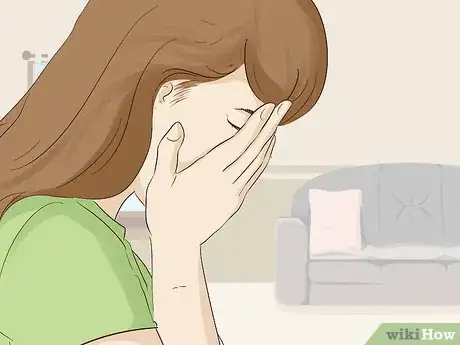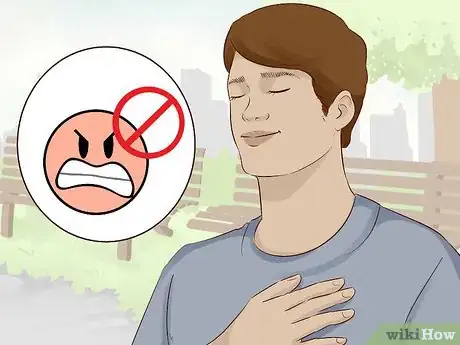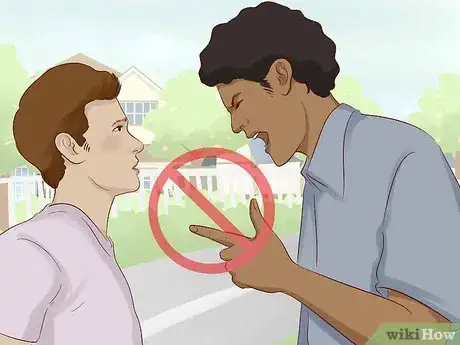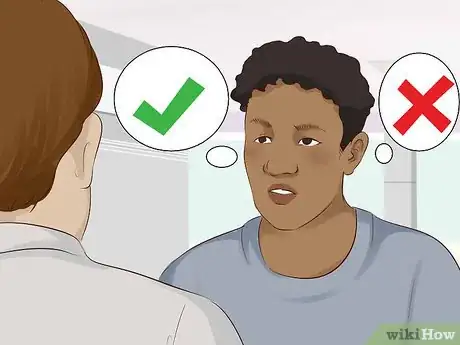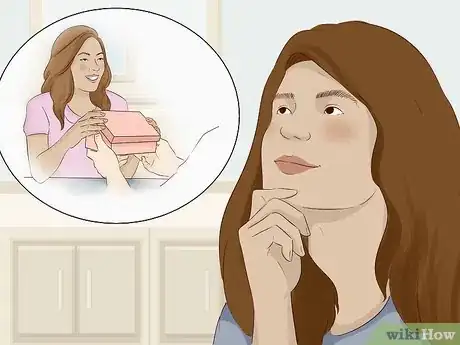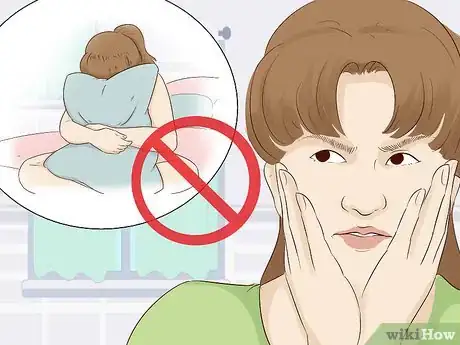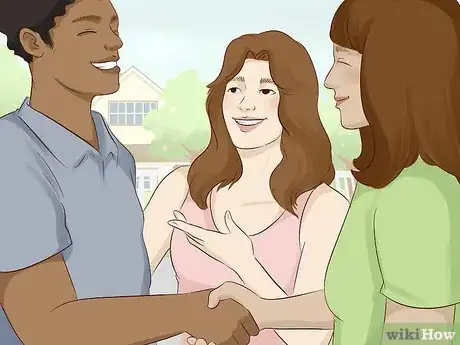This article was co-authored by Rebecca Tenzer, MAT, MA, LCSW, CCTP, CGCS, CCATP, CCFP. Rebecca Tenzer is the owner and head clinician at Astute Counseling Services, a private counseling practice in Chicago, Illinois. With over 18 years of clinical and educational experience in the field of mental health, Rebecca specializes in the treatment of depression, anxiety, panic, trauma, grief, interpersonal relationships using a combination of Cognitive Behavioral therapy, Psychodynamic therapy, and other evidence-based practices. Rebecca holds a Bachelor of Arts (BA) in Sociology and Anthropology from DePauw University, a Master in Teaching (MAT) from Dominican University, and a Master of Social Work (MSW) from the University of Chicago. Rebecca has served as a member of the AmeriCorps and is also a Professor of Psychology at the collegiate level. Rebecca is trained as a Cognitive Behavioral Therapist (CBT), a Certified Clinical Trauma Professional (CCTP), a Certified Grief Counseling Specialist (CGCS), a Clinical Anxiety Treatment Professional (CCATP), and a Certified Compassion Fatigue Professional (CCFP). Rebecca is also a member of the Cognitive Behavioral Therapy Society of America and The National Association of Social Workers.
There are 15 references cited in this article, which can be found at the bottom of the page.
This article has been viewed 49,190 times.
When you've been seriously hurt, it can feel like you're drowning. Life plays out like a scene from a movie as you grab desperately for anything to hold on to keep your head afloat. Well, let wikiHow be your rock. Below, you'll find great advice for dealing with your experience in a healthy way, forgiving those who hurt you, and moving on to an incredible life. Just get started with Step 1 below!
Steps
Healthfully Handling Pain
-
1Allow yourself to feel pain. Before you forgive and move on, it is important to allow yourself to feel pain for a little while.[1] Sadness, regret, anger, disappointment: these are all normal, healthy emotions. If you don't allow yourself to feel them for at least a little while every now and again, then you'll find yourself unable to cope with many difficult situations. Our ability to be sad in a healthy way and then move on after a short period of time is like a muscle, and you have to exercise yours in order to keep it in peak condition.[2]
- Don't let people make you feel bad for having an emotional response to this situation. Emotions are normal and healthy.
- Show yourself love and forgiveness while you accept the negative emotions that come with being hurt.[3]
-
2Take some time to be sad. Let yourself be sad (or angry, disappointed, whatever) for a few days or a few months, depending on the seriousness of the situation, and then let that feeling go. Let it go. The more time you spend being sad, the less time you have available to spend on filling your life with joy and great new experiences.[4]Advertisement
-
3Speak up about how you've been hurt. Forgiving, coping, and moving on from being hurt doesn't mean not saying anything. You should speak up when someone has wronged you! This is especially important if they've done this more than once. You need to let people know how their poor behavior effects you. This is healthy for you and a good learning experience for them.
- If they continue to be a source of pain in your life, consider that maybe they don't deserve to be in your life anymore. This may be a healthier choice for both of you.
-
4See the big picture. Sometimes people really hurt us but sometimes it's also easy to get caught up in small arguments and problems that don't matter as much as we think they do at the time. Try to look at the issue you're having in a big picture way. Maybe you and your bestie are fighting over a boy. But after so many years of close friendship and real emotional support, does this boy really matter to you as much as your relationship with your best friend? These are the kinds of things you need to remember. Yes, your feelings will be hurt and you'll be right to be hurt, but try to keep perspective about how much that hurt means.[5]
-
5Stop viewing yourself as a victim. You have to stop seeing yourself as a victim or a survivor and start seeing yourself as someone who took control of the situation they were in and made their lives better.[6] Seeing yourself as a victim will make you continue to feel powerless and hurt. Seeing yourself as a survivor will lead you to continue to define yourself by this experience. You want to reach a point where it's just something that happened to you and one of the many things that's helped make you the person that you are.[7]
- For example, if your boyfriend dumped you, don't just keep thinking of yourself as that girl who got dumped. You're you, not that label.
Forgiving Gracefully
-
1Take some time to cool off. Take some time immediately after being hurt in order to cool off. Usually, a couple of hours to a day is a good period of time. When you're really hurt, in the moment, you tend not to think and you can easily end up saying things you don't mean or saying things in a way that's not constructive to anyone. You want your words to be thought out and have an impact, so give yourself a little while to think.[8]
-
2Understand the people who hurt you. Try to understand the person that hurt you. People, unless they're actual sociopaths, always have feelings and a good reason for doing what they do. People are also rarely maliciously mean. Most of the time, they're just doing their best and trying to do what they think is the right thing to do. And a lot of the time, just like the rest of us, they make mistakes.[9]
- Try to think about why they might have thought what they were doing was right. This will help you sympathize with them and feel better about what happened.
- Just because someone did something with good intentions or simply didn't think about the hurt they'd cause, doesn't excuse them or make them right. If they did something bad, you should still let them know (kindly) so that they can make the right choice in the future.
-
3Put yourself in their place. Now, imagine you were them, trying to make the same choice. Really try to set aside your bias. You'd probably have made the same choice, right? Or, at least, you probably made a similar choice for similar reasons in the past (maybe when you were young and didn't know better). Thinking about this will also help you understand them and what happened, which will make you feel better.[10]
- Remember that people usually have more stresses of sadness and stress in their life than they let on. They might have not been in the best mental condition when they did what they did, which might explain really strange or cruel choices. We can't be at our best 100% of the time, so try to have sympathy for them.
-
4Accept their apology. A good place to start when forgiving someone is to accept their apology. Give them the benefit of the doubt and take them at their word that they really are sorry. People can be truly sorry and still continue to make mistakes (even the same mistake on occasion). Accept their apology, believe it, not just for them but for you too. It can really help you in your own healing process.
- Accepting someone's apology doesn't entitle them to anything or mean you have to do anything. You don't have to be nice or happy around them all of a sudden. It's even okay to keep them out of your life still, if that's what's best for you.
-
5Release your hatred.[11] Now, this is really important. If you feel hate for them, you have to stop. Hatred is an emotion that doesn't do anyone any good. It doesn't punish them and it doesn't make you any happier. For your own emotional health, you have to stop hating them. Instead, focus on not thinking about them at all, if you can't follow the earlier steps and come to understand them better.[12]
-
6Give up on revenge. Revenge is another thing that doesn't do anyone any good. Thinking of revenge will only consume you and make your life all about the pain that you suffered. Would you rather that your life was about your pain or about all of the happy, amazing things you're going to do now? The best revenge that you can have is to go on to live an amazing, productive, fulfilling life which won't happen while you sit around being angry.[13]
-
7Make your pain mean something. A good way to truly forgive someone in your heart is to be happy that what happened happened. You do this by turning your experience into something meaningful and positive.[14] Find a lesson to be learned in what happened to you or devote some of your time and experience to helping keep others from making the same mistake.[15]
- One example would be if you had a long-term relationship end. Don't see it as the end of all your happiness. Instead, take the experience as something that helped shape who you are and helped make you into the person that your future spouse will love even more.
- Another example would be if you were subject to racism, use your experiences to go into schools and give a talk about how racism affects the lives of other people.
-
8Think about whether you'd want the other person to forgive you if the tables were turned. A big part of forgiveness is letting go of the emotions that have a stranglehold on your heart and shifting your perspective. Here's a simple exercise that helps you do just that. Put yourself in the other person's shoes and ask yourself: would I want the other person to forgive me if I did something wrong?[16]
- Most people who are honest with themselves answer yes. Because forgiveness means so much when it comes from an unexpected place. It inspires us to give to other people. It helps us become better versions of ourselves. Most importantly, it heals bonds. The truth is that most people would rather live together with other people than live apart.
-
9Write a letter, pour your heart into it, and then burn it. Yes, you heard right. Write the most emotionally raw letter you can. Describe exactly how you feel and why you're angry. Spare no details. Then burn it. This sounds really dramatic, but for a lot of people, it works. Because the burning letter is a reminder that everything is temporary — even pain and hatred. Once you realize this, you should be a lot more ready to forgive.[17]
- People have a name for this process: catharsis. Catharsis is a release of bad emotions on a path to relief. Catharsis helps you feel better, and it's why doctors and psychological professionals tell you to talk about your feelings and even relive them.
Moving On to Joy
-
1Refocus your energy. Being upset, hatred, wanting revenge: all of these take up a lot of energy and time! That's time that you could be spending doing something that makes you feel happy and fulfilled. It might even be keeping you from meeting new and exciting people. Put those negative feelings aside and find a new use for your energy. This could be pursuing a promotion, learning a new skill, or improving your grades![18]
- Giving yourself a busy and set schedule can help, especially during the early period when you haven't quite changed your own heart yet.
-
2Look for the helpers. When bad things happen, it's easy to focus only on the bad thing and ignore all of the incredible good deeds that people do in response. Look back on your pain and think about the people that were there for you. It's important to really embrace the love that they showed you and spend some time showing them your gratitude.
- For example, your best friend holding back your hair after you stress-vomit from seeing your ex. That's an incredible act of love that you should not put aside or forget.
-
3Stop reliving the experience. Continuing to tell the story of what happened to you over and over again simply makes you relive the experiences and leaves you feeling like a victim. Don't be a victim. Dwelling on these negative experiences can also drive away people who would otherwise really like to make you happy. When we fill our spirits with spite and sadness, we wear those emotions on the outside too. This is often scary and unattractive to people. You don't want to drive away good people...then the person that hurt you has won![19]
- See a Certified Clinical Trauma Professional if you're concerned about repressed memories or if you find you can't stop thinking about the experience.[20]
- If someone asks you about the topic, you can certainly still tell them about it if you want to, but the important idea here is to stop identifying yourself and your life as being all about that terrible thing that happened.
-
4Remember better times. When we're focused on bad things, it's easy to forget about all the good things that happened too. A breakup may make you forget what might have been many happy years with that person. A fight with your friend may make you forget about the happier times and fun the two of you had. Thinking about these good times and realizing that you can make new happy memories can help you move on.
- Write down a list of 5 things you're grateful for.[21]
-
5Make new happy memories. Making new happy memories, really working to enjoy life while you have it, is one of the best ways to move on. When we feel really bad, it's easy to forget that life goes on but it really does. The more happy things you do, the more your soul will begin to come back in and wake up within you. Before you know it, you won't even be thinking about the things that hurt you.
- A great route to take is to travel. Travel somewhere really crazy, where you don't speak the language. This will force your brain to focus on all new sets of problems and experiences. You'll be so busy enjoying yourself that you'll end up leaving those past experiences exactly where they belong: in the past.
-
6Rebuild trust. In order to move on, you'll probably need to start rebuilding trust at some point. This might mean rebuilding trust with the person that hurt you, but it mostly means rebuilding trust with yourself and with those who might be able to hurt you again. Unfortunately, a big part of rebuilding trust is giving people the chance and letting them surprise you. You'll have to make yourself vulnerable, but the payoff will be worth it.[22]
- Your heart might get a little rained on, but that doesn't mean you should lock it inside and away. Just give it an umbrella and let it sing in the rain until happiness comes to call again. Someone will come that will deserve your trust and you will be so glad that you let them into your life.
-
7Make new connections. Meet new people! You never know who's going to surprise you and take your life in a whole new, amazing direction. Whether you're making new friends, making new romantic connections, or building the family you wish you had, meeting new people is how you move on to new experiences and new happy times.[23]
- You can meet new people by joining clubs or taking classes. Try your local community center in order to find something that appeals to you.
- Remember, you shouldn't close doors before you get a chance to look inside. Just because someone doesn't seem like your usual type doesn't mean that they won't make your life feel like the dream you never thought you'd realize. Give people the chance to surprise you.
-
8Live a great life. Like we said, living a great life is the best revenge. When you're pursuing your happiness, embracing life to its fullest, and doing things that make you feel fulfilled, all the stuff that hurt you before is going to feel like a Cliffnote. Don't sweat the past and instead look forward to the future![24]
Expert Q&A
Did you know you can get expert answers for this article?
Unlock expert answers by supporting wikiHow
-
QuestionHow do you accept your own past mistakes and move on?
 Rebecca Tenzer, MAT, MA, LCSW, CCTP, CGCS, CCATP, CCFPRebecca Tenzer is the owner and head clinician at Astute Counseling Services, a private counseling practice in Chicago, Illinois. With over 18 years of clinical and educational experience in the field of mental health, Rebecca specializes in the treatment of depression, anxiety, panic, trauma, grief, interpersonal relationships using a combination of Cognitive Behavioral therapy, Psychodynamic therapy, and other evidence-based practices. Rebecca holds a Bachelor of Arts (BA) in Sociology and Anthropology from DePauw University, a Master in Teaching (MAT) from Dominican University, and a Master of Social Work (MSW) from the University of Chicago. Rebecca has served as a member of the AmeriCorps and is also a Professor of Psychology at the collegiate level. Rebecca is trained as a Cognitive Behavioral Therapist (CBT), a Certified Clinical Trauma Professional (CCTP), a Certified Grief Counseling Specialist (CGCS), a Clinical Anxiety Treatment Professional (CCATP), and a Certified Compassion Fatigue Professional (CCFP). Rebecca is also a member of the Cognitive Behavioral Therapy Society of America and The National Association of Social Workers.
Rebecca Tenzer, MAT, MA, LCSW, CCTP, CGCS, CCATP, CCFPRebecca Tenzer is the owner and head clinician at Astute Counseling Services, a private counseling practice in Chicago, Illinois. With over 18 years of clinical and educational experience in the field of mental health, Rebecca specializes in the treatment of depression, anxiety, panic, trauma, grief, interpersonal relationships using a combination of Cognitive Behavioral therapy, Psychodynamic therapy, and other evidence-based practices. Rebecca holds a Bachelor of Arts (BA) in Sociology and Anthropology from DePauw University, a Master in Teaching (MAT) from Dominican University, and a Master of Social Work (MSW) from the University of Chicago. Rebecca has served as a member of the AmeriCorps and is also a Professor of Psychology at the collegiate level. Rebecca is trained as a Cognitive Behavioral Therapist (CBT), a Certified Clinical Trauma Professional (CCTP), a Certified Grief Counseling Specialist (CGCS), a Clinical Anxiety Treatment Professional (CCATP), and a Certified Compassion Fatigue Professional (CCFP). Rebecca is also a member of the Cognitive Behavioral Therapy Society of America and The National Association of Social Workers.
Clinical Therapist & Adjunct Professor Clinical Therapist & Adjunct ProfessorExpert AnswerWe are all human, so we are bound to make errors in judgment! The most important thing is did you learn from the mistake? Did you make amends with the people that you hurt and did you problem solve to make things better? Practicing gratitude is a really effective way to work on self-love and self-compassion. Every morning when you wake up, jot down 5 things you’re grateful for and make sure to incorporate things that are specific to your own personal strengths, growth, and healing. One of the 5 items can be an area of improvement that you’d like to work on. That way, you're validating that there has been an issue, but not letting your past define who you are as a person in the present.
Clinical Therapist & Adjunct ProfessorExpert AnswerWe are all human, so we are bound to make errors in judgment! The most important thing is did you learn from the mistake? Did you make amends with the people that you hurt and did you problem solve to make things better? Practicing gratitude is a really effective way to work on self-love and self-compassion. Every morning when you wake up, jot down 5 things you’re grateful for and make sure to incorporate things that are specific to your own personal strengths, growth, and healing. One of the 5 items can be an area of improvement that you’d like to work on. That way, you're validating that there has been an issue, but not letting your past define who you are as a person in the present. -
QuestionHow do you truly forgive and let go?
 Nicolette Tura, MANicolette Tura is an Authentic Living Expert who operated her own wellness business for more than ten years in the San Francisco Bay Area. Nicolette is a 500-hour Registered Yoga Teacher with a Psychology & Mindfulness Major, a National Academy of Sports Medicine (NASM) certified Corrective Exercise Specialist, and is an expert in authentic living. She holds a BA in Sociology from the University of California, Berkeley and got her master's degree in Sociology from SJSU. She constantly draws from her own wounds and challenges; with her training in the healing arts and sociology, she offers potent content, powerful meditations, and game-changing seminars on inspiring elevation on a personal and corporate level.
Nicolette Tura, MANicolette Tura is an Authentic Living Expert who operated her own wellness business for more than ten years in the San Francisco Bay Area. Nicolette is a 500-hour Registered Yoga Teacher with a Psychology & Mindfulness Major, a National Academy of Sports Medicine (NASM) certified Corrective Exercise Specialist, and is an expert in authentic living. She holds a BA in Sociology from the University of California, Berkeley and got her master's degree in Sociology from SJSU. She constantly draws from her own wounds and challenges; with her training in the healing arts and sociology, she offers potent content, powerful meditations, and game-changing seminars on inspiring elevation on a personal and corporate level.
Authentic Living Expert Ask yourself what you learned from the situation and how much it is costing you to hold onto your feelings. Understand that if we don't forgive the situation or the person, we end up suffering because it can take away our peace and our energy. You never have to tell that person you forgive them, but try to find ways to move on and ceremoniously honor that forgiveness.
Ask yourself what you learned from the situation and how much it is costing you to hold onto your feelings. Understand that if we don't forgive the situation or the person, we end up suffering because it can take away our peace and our energy. You never have to tell that person you forgive them, but try to find ways to move on and ceremoniously honor that forgiveness.
References
- ↑ Nicolette Tura, MA. Authentic Living Expert. Expert Interview. 23 January 2020.
- ↑ https://greatergood.berkeley.edu/article/item/eight_keys_to_forgiveness
- ↑ Rebecca Tenzer, MAT, MA, LCSW, CCTP, CGCS, CCATP, CCFP. Clinical Therapist & Adjunct Professor. Expert Interview. 19 August 2020.
- ↑ https://www.betterhealth.vic.gov.au/health/healthyliving/its-okay-to-feel-sad
- ↑ https://au.reachout.com/articles/how-to-forgive-someone
- ↑ http://www.mayoclinic.org/healthy-living/adult-health/in-depth/forgiveness/art-20047692
- ↑ Nicolette Tura, MA. Authentic Living Expert. Expert Interview. 23 January 2020.
- ↑ https://www.psychologytoday.com/us/blog/fixing-families/201806/after-argument-the-right-way-make
- ↑ https://www.psychologytoday.com/us/blog/mindful-anger/201409/how-do-you-forgive-even-when-it-feels-impossible-part-1
- ↑ https://au.reachout.com/articles/how-to-forgive-someone
- ↑ Nicolette Tura, MA. Authentic Living Expert. Expert Interview. 23 January 2020.
- ↑ https://www.mayoclinic.org/healthy-lifestyle/adult-health/in-depth/forgiveness/art-20047692
- ↑ https://www.psychologytoday.com/us/blog/pieces-mind/201309/revenge-will-you-feel-better
- ↑ Nicolette Tura, MA. Authentic Living Expert. Expert Interview. 23 January 2020.
- ↑ https://greatergood.berkeley.edu/article/item/eight_keys_to_forgiveness
- ↑ https://www.mayoclinic.org/healthy-lifestyle/adult-health/in-depth/forgiveness/art-20047692
- ↑ https://www.psychologytoday.com/us/blog/write-yourself-well/201403/transactional-writing-letters-heal
- ↑ Nicolette Tura, MA. Authentic Living Expert. Expert Interview. 23 January 2020.
- ↑ https://www.psychologytoday.com/us/blog/what-mentally-strong-people-dont-do/201602/5-ways-stop-reliving-painful-memories
- ↑ Rebecca Tenzer, MAT, MA, LCSW, CCTP, CGCS, CCATP, CCFP. Clinical Therapist & Adjunct Professor. Expert Interview. 19 August 2020.
- ↑ Rebecca Tenzer, MAT, MA, LCSW, CCTP, CGCS, CCATP, CCFP. Clinical Therapist & Adjunct Professor. Expert Interview. 19 August 2020.
- ↑ https://www.psychologytoday.com/us/blog/living-forward/201609/how-rebuild-trust-someone-who-hurt-you
- ↑ https://www.helpguide.org/articles/relationships-communication/making-good-friends.htm
- ↑ https://www.mayoclinichealthsystem.org/hometown-health/speaking-of-health/7-tips-to-live-a-happier-life



